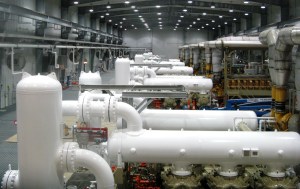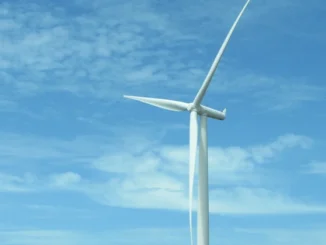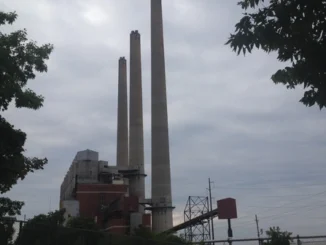
This story was originally published by Planet Detroit.
Environmental groups charge that a $50 million pot of money intended for “low carbon” infrastructure projects was largely a gas industry subsidy floated under the guise of a clean energy initiative.
Last week, the state awarded $32 million of the funds to gas proposals from DTE Energy, Consumers Energy, and other industry players to boost biogas production or expand DTE’s fossil gas infrastructure in the Upper Peninsula. The remainder of the funding went to battery storage, solar, and other initiatives that advocates say truly support the expansion of low-carbon infrastructure.
“Unfortunately while the program is going to fund a number of worthy and important clean energy projects, the vast majority of this money feels like a subsidy for fossil fuel industry dressed up like low carbon funding, and all at the expense of taxpayers,” said Samantha Williams, director of the Natural Resources Defense Council’s Midwest climate & clean energy program.
The report comes as Gov. Gretchen Whitmer aims to reduce emissions in the state by 52% by 2030, and build a carbon-neutral economy by 2050, but the grants’ critics say the gas industry giveaway is at odds with the governor’s goals.
Get connected
Every morning, thousands of energy professionals turn to our newsletters for the day’s most important news. Sign up for free to get the latest delivered straight to your inbox.
Natural gas emits greenhouse gases when burned, accounting for 80% of residential and commercial sector emissions in 2021. Biogas is touted by the industry as a fuel that burns cleaner than fossil gas, and it is being pushed as an alternative to wind, solar, and electrification, but mounting evidence has cast doubt on its viability because of cost and methane leaks.
The subsidies also come as the gas industry fights for its life and seeks help from legislators – the bills enabling the funding were authored and co-sponsored by representatives and senators who had collectively taken tens of thousands of dollars in campaign contributions from utilities or gas industry groups.
The legislation was initially designed by the 2022 GOP-controlled legislature to subsidize only the gas industry, but environmental groups worked to broaden the definition to include true clean energy projects, said Mike Berkowitz, a senior representative with the Sierra Club’s Beyond Coal Campaign.
The state gave about $28 million in funding for biogas, also called “renewable natural gas,” despite the state’s own feasibility study, released late last year, highlighting the limited role the fuel could play in Michigan’s economy.
However, the industry continues pushing for more gas infrastructure because electrification may render its gas operations obsolete. They see biogas as a lifeline – DTE and Consumers Energy have already invested substantial sums in natural gas plants and pipelines in recent years.
Among the controversial awards is $7.2 million for a DTE Energy project that the company says will expand fossil gas access to about 2,000 homes and businesses across three Upper Peninsula counties now served by propane.
In its press release, the Michigan Public Services Commission, which regulates the state’s private utilities and managed the grant process, wrote that the grant program was partially intended for “[biogas] and expansion of natural gas to areas now reliant on propane.”
Eligibility for the funding required applicants to show that their plan would reduce emissions and/or save ratepayers money. DTE’s grant application states that it will reduce greenhouse gas emissions by 14%, and natural gas would be about 40%-60% cheaper than propane, though the price of natural gas is steadily climbing. Residents in some counties commented during the review process and asked the MPSC to approve the application.
However, switching to an electric heating source, like a heat pump, would eliminate greenhouse gas emissions. A 2022 break-even analysis commissioned by the Michigan Public Service Commission showed that replacing a propane heat source with a heat pump could pay off in 4-9 years based on current costs and conditions.
Still, none of the projects that received funding would directly promote heat pump usage in the Upper Peninsula.
“It is really disappointing to see the state not fully validating that opportunity and instead tethering these folks to another fossil fuel that exposes them to price volatility and, of course, carries all the climate burdens that fossil fuels do,” said Karlee Weinmann, research and communications manager with utility industry analyst Energy and Policy Institute.
In a statement to Planet Detroit, an MPSC spokesperson said the agency had its hands tied by the legislation that created the funding, which contained “specific criteria for applicants.”
“Ultimately, the spokesperson wrote that the MPSC selected projects that received the best scores based on requirements and criteria laid out in the Legislature’s boilerplate language of” the legislation.
The state received 32 proposals, with many of the applications from gas industry entities. DTE and CMS submitted multiple applications.
Sierra Club’s Berkowitz said it was true that “the intent of appropriations for this grant was for fossil fuels.” Still, he noted that the MPSC had the authority to do more to solicit solar, battery storage, wind, geothermal, and other clean energy projects they were underrepresented in the applicant pool. He said municipalities and clean energy companies were “scrambling” to submit proposals.
“The MPSC could have done more to ensure that true clean energy solutions that will mitigate climate change and improve public health would have been a part of this package,” he said.
Among the largest biogas awards was $5.6 million for Consumers Energy’s Swisslane Farm infrastructure. The project would convert gas captured from manure into gas that CMS claims could heat nearly 1,000 homes daily.
But it is unclear if that will provide power in Michigan. While the state’s anaerobic digesters that capture biogas from landfills generate about 135 megawatts added to the grid, its facilities that capture gas from manure all ship fuel to California, which has a much more robust alternative fuel credit program in place.
The state’s 2022 biogas analysis found, in the best-case scenario, that biogas could replace 8%-22% of the state’s fossil gas use. Moreover, MPSC Chair Dan Scripps previously told Planet Detroit biogas is “not going to be a silver bullet” but added it could address those “hardest-to-decarbonize places” where electrification won’t work.
“If it’s that last 8% that there’s no other alternative to decarbonize, then it could have some use,” he said.
Clean energy advocates said the high level of subsidies for biogas made little sense in the context of the state report and Scripps’ comments.
“It is striking to me that the state itself found very limited potential with benefits related to [biogas], but the choice is being made to further invest despite these findings,” Weinmann said.
Allowing the gas industry and its political allies to define gas as “low carbon” amounts to greenwashing and creates a separate setback in the decarbonization effort, NRDC’s Williams added.
“It’s quite damaging to our efforts to allow gas to be considered within a low carbon grant funding program,” she said. “This is a troubling trend, and it is important that we keep a close eye on it because there are lasting impacts.”
But clean energy advocates who spoke with Planet Detroit also stressed that they applauded the state for the portion of the funding that went to what they call truly low-carbon projects.
Among those:
City of Lansing solar project, $1 million.
City of Traverse City solar and battery energy storage project, $1,685,479.
Hope Network solar and battery storage project, $3,655,547.
Lansing Board of Water and Light grid-scale battery energy storage system and ground-mounted solar system project, $12 million.
5 Lakes Energy infrastructure planning toolkit project, $1,247,796.
Kalamazoo Nature Center EV infrastructure planning project, $265,000.
Public Sector Consultants planning for regional community solar for Lansing-area communities project, $151,340.
Shelby Charter Township EV infrastructure planning project, $158,800.
Slipstream low carbon energy planning for Native Nations project, $749,990.



